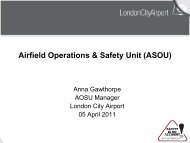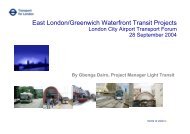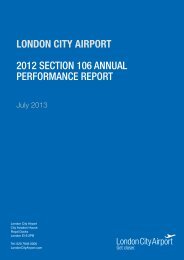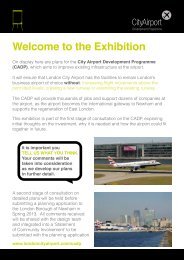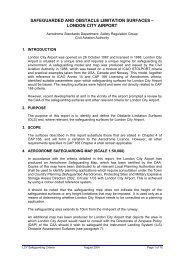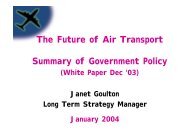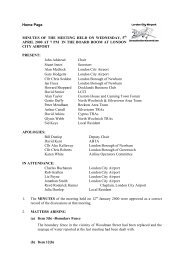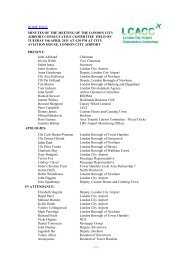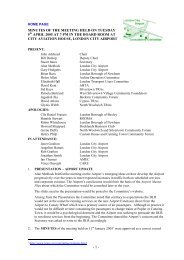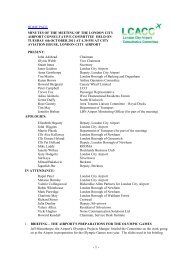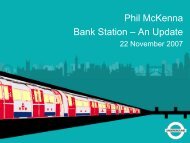The Mayor's Ambient Noise Strategy - Greater London Authority
The Mayor's Ambient Noise Strategy - Greater London Authority
The Mayor's Ambient Noise Strategy - Greater London Authority
Create successful ePaper yourself
Turn your PDF publications into a flip-book with our unique Google optimized e-Paper software.
86 Mayor of <strong>London</strong><br />
<strong>The</strong> Mayor’s <strong>Ambient</strong> <strong>Noise</strong> <strong>Strategy</strong><br />
waiting. Conditions for passengers with a hearing impairment or other<br />
disability need to be considered, e.g. in relation to any audible signals. <strong>The</strong><br />
location of bus stands is becoming a sensitive environmental issue. More<br />
space and new sites are needed for an expanding network. <strong>London</strong> Buses<br />
and boroughs need to work together to find facilities which meet the<br />
needs of an effective network, and address local environmental<br />
sensitivities. Consultation on bus issues is covered in Box 20 above,<br />
following paragraph 4A.6. <strong>The</strong> potential impact of noise is considered in<br />
the design and construction of bus stations and other facilities. Most bus<br />
garages are operated and maintained by the bus operators, and vary widely<br />
in type and design. Issues of screening, enclosure and operation are best<br />
decided in relation to specific local contexts. At relevant termini and<br />
garages, notices are posted to remind drivers that engines should not be<br />
kept idling while stationary, and action is taken by inspectors if it occurs.<br />
policy 15<br />
policy 16<br />
Within the context of ensuring efficient operation of the road network<br />
and in particular of buses, Transport for <strong>London</strong> will consider practicable<br />
and cost-effective measures to secure quieter road traffic operation,<br />
particularly at night.<br />
Transport for <strong>London</strong> will require operators and designers of existing and<br />
proposed bus garages, termini and other bus-related facilities to reduce<br />
noise to a cost-effective and practicable minimum, with particular<br />
emphasis on night-time noise.<br />
proposal 12 Transport for <strong>London</strong> will work to secure practicable and cost-effective<br />
noise control and management on <strong>London</strong>’s bus network. Potential<br />
elements include:<br />
■ Working with bus operators and suppliers as bus fleets are replaced, to<br />
secure use of quieter vehicles;<br />
■ Assessing the need for and potential of in-service testing;<br />
■ In association with work on reducing bus air pollutant emissions,<br />
reviewing the opportunities which alternative fuels and other<br />
technologies offer for quieter bus running, including trials of zero<br />
emission buses operating on fuel cells, and exploring the potential of<br />
technologies such as hybrid diesel-electric and gas-electric drive;<br />
■ Working with bus companies to secure smoother and quieter driving,<br />
‘no idling’ and other good practices at bus stands, including through<br />
driver training; and<br />
■ As resources and priorities allow, assessing passenger attitudes towards<br />
noise and sound quality on the bus network, alongside other quality of<br />
service issues, having particular regard to the needs of hearing and<br />
sight-impaired people.



